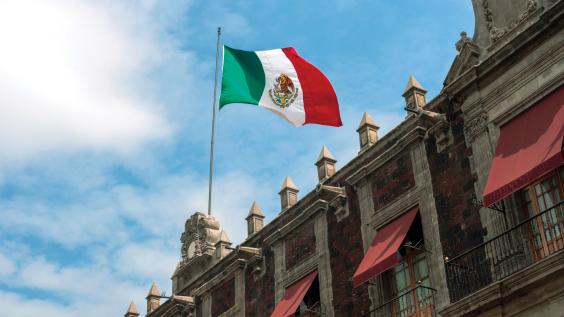Mexico’s Diplomatic Strategy and Anti-Mexican Climate in the United States

Table of Contents
Author(s)
Share this Publication
- Download PDF
- Print This Publication
- Cite This Publication Copy Citation
Morales, Isidro. 2016. Mexico’s Diplomatic Strategy and the Anti-Mexican Climate in the United States. Issue Brief no. 05.10.16. Rice University’s Baker Institute for Public Policy, Houston, Texas.
A New Mission for Mexico’s Diplomats
On April 5, Republican presidential frontrunner Donald Trump unveiled his plan to bill Mexico for the construction of a wall along the U.S.-Mexico border. If elected president, Trump said he will require Mexico to pay $5 billion–$10 billion to finance the wall or he will divert that amount from remittances sent by Mexican workers in the United States to their home country.
On the same day, Mexico’s government announced it had reshuffled its U.S. diplomatic staff. Gone was Mexico’s ambassador to the U.S., Miguel Basañez, a respected academic specializing in Hispanic public opinion who had been appointed to the position only seven months earlier. His replacement is Carlos Sada, a career diplomat who has previously served as Mexico’s consul general in Los Angeles, New York, Chicago, and San Antonio. Sada’s accreditation by the U.S. Department of State is pending.
In addition, the Mexican government named its foreign press secretary and “country brand” coordinator, Paulo Carreño, to the high-profile position of deputy secretary of foreign relations in charge of North American affairs. With a long career in the business and financial sector, Carreño was known for his oversight of President Enrique Peña Nieto’s communications program and image. Mexico’s diplomatic turnover is a response to what the country’s secretary of foreign affairs, Claudia Ruiz Massieu, told the El Universal newspaper is an “exacerbated mood” against Mexicans in the U.S. and the fear that “this spirit can grow and overflow and may generate hostilities.” After months of near silence regarding Trump’s increasingly hostile comments about Mexico, the country through its foreign ministry is now trying to protect its image and respond more vigorously to anti-Mexican rhetoric.
Criticism From the U.S and Abroad
This is not the first time the Mexican government has dealt with anti-Mexican sentiment in the U.S. For example, in 1986 Sen. Jesse Helms of North Carolina “denounced the Mexican government and disparaged the Mexican people”1 during a congressional hearing on drug trafficking and other problems related to Mexico.2 Unsurprisingly, the senator’s remarks were perceived by the administration of Miguel de la Madrid as offensive. Similarly, as the U.S. Senate prepared to vote on the North American Free Trade Agreement (NAFTA), Texas businessman Ross Perot—then running as an independent presidential candidate in the 1992 elections—accused Mexico of trying to “suck in” American jobs. Perot argued that NAFTA should be rejected.
What is new in the latest wave of antiMexican rhetoric is that Mexican migrants have been criminalized and called drug traffickers and rapists,3 and Mexico’s positive economic performance has been attributed to the “theft” of U.S. jobs.4 Given this attitude toward Mexican migrants, the Mexican government for the first time has openly recognized a “hostile climate” in the U.S. and directed its diplomats to deal with the situation before it gets worse.5
The Mexican government’s ability to deal with this challenge would be easier if the “hostility” came solely from Trump. It is well known that Trump’s discourse can be confrontational, and that he has insulted many different constituencies. The problem, however, goes beyond the candidate to those who may be influenced by his rhetoric. Trump’s supporters, including lower-skilled white workers, are listening and nodding as he exhorts them to consider the threat posed by the social mobility of higher-skilled Hispanic workers; he has also called on the most conservative faction of the Republican Party to take a stand against migration. Although his campaign has split the Republican Party, Trump is the presumptive GOP nominee for president. The Mexican government views the fallout from Trump’s words as a direct threat to U.S.-Mexico relations. Thus, the Mexican diplomats’ new mission is to soften the Republican Party’s stance toward migrants, especially Mexican migrants, and to exploit current divisions among Republicans.
This is a tall order. It will be difficult for Mexican diplomats to deal with not only the criticism of Mexico and migrants in the U.S. media and policy circles, but also criticism of the Mexican government’s response to organized crime, human rights issues, social unrest, and corruption. In January 2016, for example, an editorial in The New York Times said that Mexico “stubbornly resists accountability." The editorial6 referenced three issues that were highly contentious at that time: the second prison escape of Sinaloa cartel boss Joaquín “El Chapo” Guzmán, the focus of an intense manhunt by Mexican and American authorities; the disappearance of 43 college students in Iguala, in the southern state of Guerrero, whom the government claimed were massacred and incinerated by a drug gang; and a government contractor’s involvement in the construction of what the Times called a “lavish” home for Peña—an arrangement loudly denounced by independent Mexican journalists.
The Times’ editorial also raised questions about the complicity of parties within the prison or at higher government levels that led to Guzmán’s spectacular escape. In addition, it noted a preliminary report issued by the Inter-American Commission on Human Rights (IACHR) that challenged the government’s version of events regarding the missing students. For example, contrary to the government’s previous explanations, the report said there is no evidence the students’ bodies were incinerated. Finally, the editorial mentioned—not without irony—that Peña appointed a friend to investigate whether a conflict of interest existed in the construction of his home.
Four days after the publication of the editorial, Carreño, then in charge of Mexico’s “country brand,” responded to the Times through a letter to the editor. Carreño defended Mexico’s efforts to fight corruption and investigate the students’ disappearance, as well as the work that made Guzmán’s third capture possible. He ended his letter by stating that, “We agree that Mexico still faces challenges. This government is working to overcome them.”7
Carreño’s response, made before Mexico reshuffled its U.S. diplomatic staff, seemed to reflect the country’s usual approach to dealing with criticism and negative perceptions of Mexico held by journalists and human rights international organizations—a defensive approach that focuses on Mexico’s efforts to address the immediate problem instead of taking a hard look at its root causes, and dealing with them.
This approach was underscored by the major storm in Mexico after the publication of the final report of the United Nations Special Rapporteur on Torture (December 2014). The author, Juan N. Méndez, asserted that Mexico’s police, ministerial authorities, and army have engaged in or approved torture and other cruel treatment to extract information and confessions from detainees. This was possible due to the culture of impunity that prevails in the country, the report said.8 Mexican authorities reacted furiously to the report, accusing Méndez of being “unprofessional” and “unethical” in his research. The authorities said they regretted that Méndez did not highlight the government’s efforts to prevent human rights abuses and lower impunity levels.
Mexico’s government is currently facing the fallout from the latest InterAmerican Commission on Human Rights report, published on December 31, 2015, which denounced not only human rights violations throughout the country but also attacks and threats against journalists. In March 2016, just prior to the reshuffling of Mexico’s U.S. diplomatic staff, Mexico appointed a new ambassador to the Organization of American States, Luis Alfonso de Alba. Alba is an expert on the United Nations system and in 2006 became the first Mexican elected president of the UN Human Rights Council. His expertise could eventually help to better explain the Mexican government's efforts to protect human rights in Mexico.
Adopting a Less Defensive Approach
As illustrated by the UN and IACHR reports, the performance of Mexico’s government—from the executive branch to the judiciary to the army—has come under the close scrutiny of the public, national media, foreign journalists, and international organizations not only in the U.S., but also abroad. In the 1980s, Mexico would have responded to outside criticism by citing its Constitution and foreign policy principles, which respect national sovereignty and non-intervention in internal affairs. However, it is pointless to use national sovereignty as a shield against international criticism since the passage of NAFTA (1994) and subsequent reforms to make Mexico’s economy and policy more open and accountable. Furthermore, during the Felipe Calderón administration (2006–2012), Mexico’s Congress passed a major constitutional amendment that made all international human rights-related treaties signed by the country enforceable in court. This means that Mexican authorities, state institutions, and public servants must recognize that their behavior may be watched and assessed by international actors.
We still do not know how a new “comprehensive strategy” to more vigorously promote Mexico’s image and to deal with the “anti-Mexican” climate in the United States will work out—or, indeed, how it will be implemented. It is clear that a policy change is necessary, since misunderstandings or ignorance about the importance of Mexican workers and trade to the U.S. economy could harm both countries. However, Mexican authorities must understand it is one thing to respond to a hostile climate; it is quite another to respond to the criticism and claims of reliable international media outlets and other organizations with credible actions to redress wrongs. To dismiss criticism by claiming it does not sufficiently recognize the efforts by Mexican authorities to deal with issues such as human rights violations falls short. In fact, Mexico should continue to restructure its judicial and governance systems to ensure the emergence of a more equitable, safe, and transparent society. This could allow the country to transition from a defensive diplomatic approach to one in which the country advocates for itself more effectively by becoming an engaged actor in the promotion and respect of democratic values and human rights. Otherwise, Mexico’s response will just be another public relations campaign conducted by its diplomatic corps.
Mexico’s newly appointed diplomats must prove their skills by separating rhetoric and opportunistic attacks from very real flaws in their own government. Opportunistic attacks are usually cyclical; they come and go. Well-informed criticism, supported by facts and credible sources, become more poisonous if government authorities do not directly respond to the issues raised.
Endnotes
1. Robert A. Pastor, The North American Idea: A Vision of a Continental Future (Oxford University Press), reprinted 2012.
2. See “Situation in Mexico,” U.S. Committee on Foreign Relations, Subcommittee on Western Hemisphere Affairs, United States Senate, 99th Congress, 2nd session, May 13, June 17, and 26, 1986. For historical context of the hearing and the irritation it provoked in Mexico, see Robert Pastor and Jorge Castañeda, Limits to Friendship, the United States and Mexico (New York, NY: Vintage Books), 1988.
3. Suzanne Gamboa, “Donald Trump Announces Presidential Bid By Trashing Mexico, Mexicans,” NBC News, June 15, 2015, http://www.nbcnews.com/news/latino/donald-trump-announces-presidential-bid-trashing-mexico-mexicans-n376521.
4. See “Republican primary debate in South Carolina," CBS News, February 13, 2016.
5. See López Dóriga Digital, “Sentimiento antimexicano en E.E.U.U. provocó cambio de embajado: Ruiz-Massieu)” (Anti-Mexican Sentiment in U.S. caused change of ambassador: Ruiz-Massieu), April 5, 2016, http://lopezdoriga.com/nacional/sentimiento-antimexicano-en-ee-uu-provoco-cambio-de-embajador-sre/.
6. “Mexico Stubbornly Resists Accountability,” Editorial, New York Times, January 4, 2016.
7. Paulo Carreño King, “Mexico’s Challenges,” New York Times, January 8, 2016.
8. Juan E. Méndez, “Informe del Relator Especial sobre la tortura y otros tratos o penas crueles, inhumanos o degradantes” (Report of the Special Rapporteur on Torture and Other Cruel, Inhuman or Degrading Punishment), United Nations Human Rights Council, 2014.
This material may be quoted or reproduced without prior permission, provided appropriate credit is given to the author and Rice University’s Baker Institute for Public Policy. The views expressed herein are those of the individual author(s), and do not necessarily represent the views of Rice University’s Baker Institute for Public Policy.



